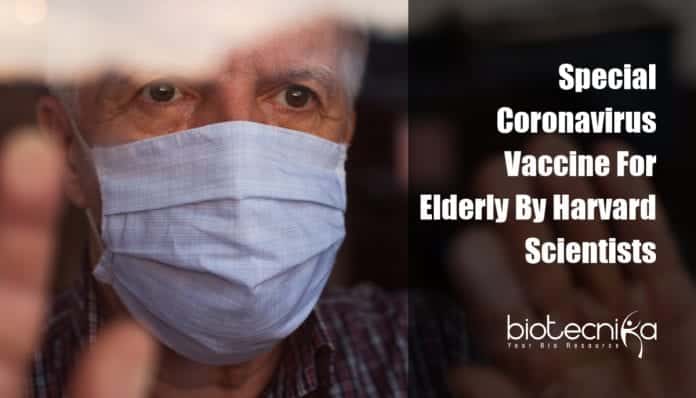Coronavirus vaccine specifically for the elderly by Harvard scientists
Many companies all over the world with more than 100 teams are racing to develop a coronavirus vaccine. Dr. Ofer Levy and a group of scientists from Harward Medical school are also working in developing a vaccine against COVID-19, however, the vaccine they’re working on is a bit different from other vaccines. Their coronavirus vaccine is specifically designed for elderly people who are at a higher risk.
Levy said, “The majority of vaccines are developed with the concept of one-size-fits-all”. “Companies and academic centers generally develop a vaccine assuming that you will certainly react to the vaccine the same way, whether you’re a male or female, whether you’re you’re young or elderly, whether you give the vaccine in the summer or winter season, whether you provide it in the morning or the night or whether you stay in the US or Africa”.
However numerous factors can affect how much defense a vaccine gives, including age. In the case of flu, it is more lethal for elderly people with weaker immunity.
The development of a vaccine is a long and expensive procedure, which is even more real for efforts to make targeted
vaccines for certain groups specifically. However Levy’s lab is researching the idea by testing coronavirus vaccine solutions on human tissue outside the body, which is made to design the immune system responses of newborn, middle-aged, and also elderly.Levy stated, “As per us, vaccines are not one-size-fits-all however, they might be one-size-fits-none-particularly-well”.
When it comes to a timeline, Levy stated that vaccines which are a one-size-fits-all will be available before the one he wishes to develop. A number of pharmaceuticals as well as biotech companies have stated they’re intending to develop a vaccine ready for emergency situation usage in the Autumn.
Human tissue outside of the body
Dr. Ofer Levy works with the Precision Vaccines Program at Boston Children’s Hospital, affiliated with the Harvard Medical School, Boston. His lab concentrates on developing “next-generation” vaccines to secure a specific group of people.
Levy’s laboratory utilizes a technology that builds human tissue outside of the body and earlier this month it also received a patent. The researchers mimic age differences by collecting blood samples from individuals of every age and add their WBC to the human tissue outside the body. For the coronavirus vaccination research study, the researchers have currently gathered samples from elderly volunteers.
The WBC identify antigens like viruses and produce immune responses against them. To see how different immune systems react to different vaccines scientists can contrast this process throughout tissue samples. That permits the lab to discover prior to the clinical trial stage that what might be most reliable for whom.
Levy said, “It’s not likely to be possible to do huge phase three clinical trials with multi-thousand person researches in every type of populace with every combination of formulations”. “That’s where modeling the human body immune system outside the body could be essential, due to the fact that it may allow us to speed up as well as de-risk development of vaccine”.
A customized medication method to vaccines
Levy said, “We expect that, in the future, there’ll be different vaccine solutions for a baby, a man, a woman, and a senior citizen”. “It’s this whole concept of customized medication, however, brought to vaccinology”.
He added, ” I was biking home from work, and there’s a newspaper machine that dispenses the news Chinese, and it had a heading, a really significant headline, huge, bold letters, but I do not read Chinese”. “However what captured my attention was the word SARS in it in English. And afterward, it obviously became more clear with the coronavirus outbreaks from Wuhan, and so we said, ‘well, our entire program is really well-positioned to aid this situation”.
Establishing efficient vaccines for senior citizens
Vaccines contain a weakened form of antigen that is meant to protect the body so that the immune system can identify the virus or pathogen and neutralize it. To enhance the immune responses the vaccine evokes, molecules called adjuvants can be included in a vaccine formulation.
He offered 4 methods in which pharmacological or immunological representatives can assist:
1. Convert an insufficient response into an extra durable one
2. Improve the range of immune response
3. Make immunity last for a longer duration
4. To make higher quantities of a vaccine more economically – Allow manufacturers to include much less of the antigen in each dose.
Adding adjuvants to a vaccine has a disadvantage of making the formula a lot more complex. However Levy thinks the benefits are worth it, and the way Levy’s lab tests adjuvants in tissue reduce the risk factors.
He added, companies and academic teams have been sending their coronavirus vaccine formulas to Levy’s team to test in addition to the laboratory’s own vaccine development.
He added, “Everyone intends to send us their adjuvants, their formulations, to test, so we can contrast, head-to-head as we’re natural partners for various other teams because we have these special systems to examine vaccines outside the body”.
He included that the laboratory has likewise ordered elderly mice to study, however, a vaccination “doesn’t go into the mice until it initially goes into a human system outside the body”.






























